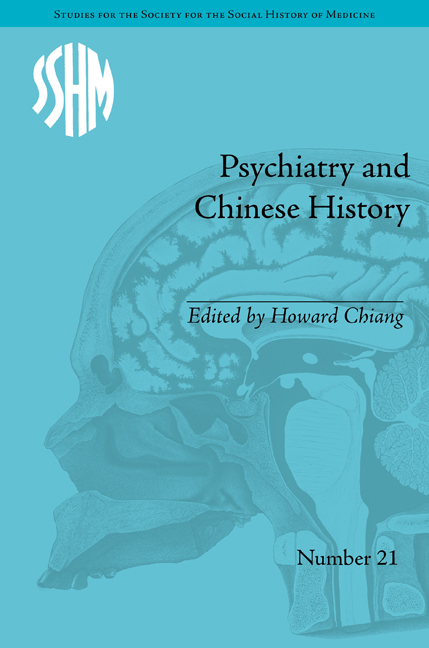Book contents
- Frontmatter
- CONTENTS
- Dedication
- List of Contributors
- List of Figures
- Introduction: Historicizing Chinese Psychiatry
- Part I Historical Precedents
- Part II Missionary Investments
- 4 Psychiatric Space and Design Antecedents: The John G. Kerr Refuge for the Insane
- 5 An Iron Cage of Civilization? Missionary Psychiatry, the Chinese Family and a Colonial Dialect of Enlightenment
- 6 Tropical Neurasthenia or Oriental Nerves? White Breakdowns in China
- Part III Biomedical Modernity
- Part IV New Therapeutic Cultures
- Afterword: Reframing Psychiatry in China
- Notes
- Index
6 - Tropical Neurasthenia or Oriental Nerves? White Breakdowns in China
from Part II - Missionary Investments
- Frontmatter
- CONTENTS
- Dedication
- List of Contributors
- List of Figures
- Introduction: Historicizing Chinese Psychiatry
- Part I Historical Precedents
- Part II Missionary Investments
- 4 Psychiatric Space and Design Antecedents: The John G. Kerr Refuge for the Insane
- 5 An Iron Cage of Civilization? Missionary Psychiatry, the Chinese Family and a Colonial Dialect of Enlightenment
- 6 Tropical Neurasthenia or Oriental Nerves? White Breakdowns in China
- Part III Biomedical Modernity
- Part IV New Therapeutic Cultures
- Afterword: Reframing Psychiatry in China
- Notes
- Index
Summary
Introduction
In a survey published on the British Journal of Medicine in November 1913, G. Price used missionary statistics to determine the major reasons for why Western residents in the tropics and sub-tropics became invalids. The most common tropical diseases among Westerners in India, Ceylon, China and Japan were neurasthenia and mental disorders. Japan had the worst scenario, with 81.25% of the white invalids diagnosed with neurasthenics. In comparison, the leading illness caught by Westerners in Africa was malaria, and neurasthenia ranked second. Among the 203 cases in China, 25% were affected by neurasthenia and 8.8% by mental diseases. In September 1915, the China Medical Journal used Price's data to emphasize the arduous life of the missionaries stationed in the country. The high prevalence of neurasthenia was mostly attributed to their tremendous responsibility and heavy workload. Similarly, Frank Oldt, an American medical missionary in Canton, stated in 1919 that nervous disorder posed the greatest health risk among foreign populations in China. In 1920, William Lennox of the Peking Union Medical College conducted a statistical study on the health of missionary families in the country and showed that nervous breakdown ranked fourth among the most frequently occurring illnesses, and nervousness was a key cause of miscarriages.
Since the early 1900s, tropical neurasthenia and other related disorders have been a focus of attention in the field of tropical medicine.
- Type
- Chapter
- Information
- Psychiatry and Chinese History , pp. 111 - 128Publisher: Pickering & ChattoFirst published in: 2014



